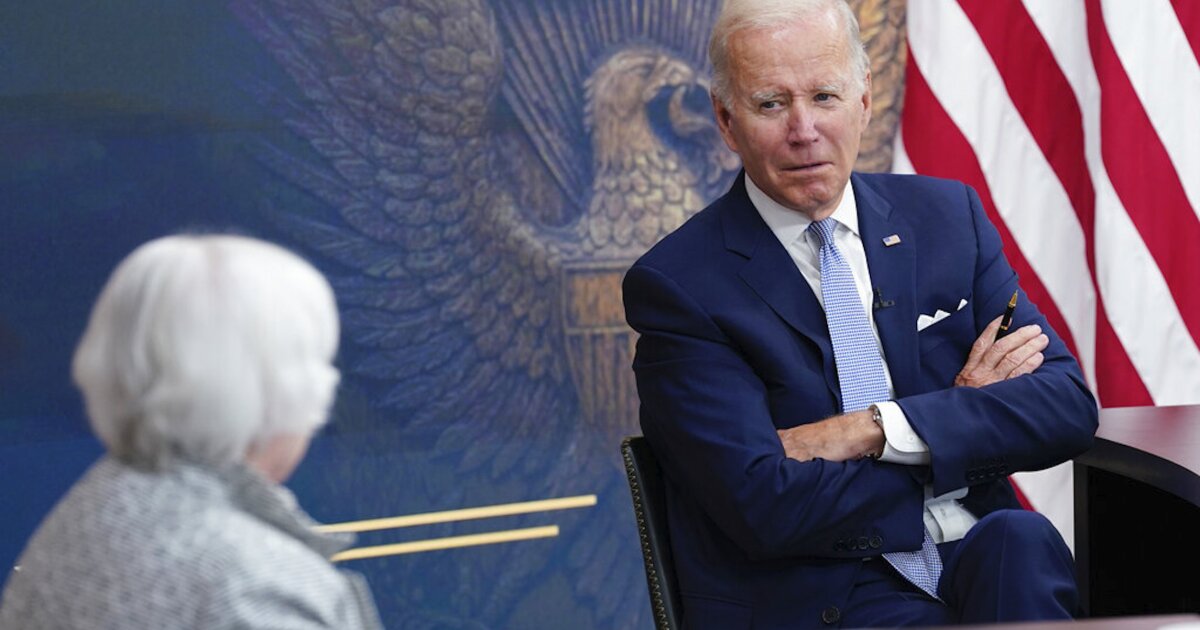

Recent remarks by President Joe Biden and his treasury secretary, Janet Yellen, appear to show a bit of dissonance about whether Biden could or should use the 14th Amendment to circumvent the debt ceiling.
Over the weekend, Biden said that the administration hasn’t ruled out invoking the amendment to avoid agreeing to terms demanded by Republicans for a vote to raise the debt ceiling, a legally dubious move that would surely face challenges in the courts. The president said Sunday that the White House is now looking into whether it has the authority to do so.
POLITICAL AND MARKET PRESSURE INCREASES TO RAISE DEBT CEILING
“I think we have the authority. The question is: Could it be done and invoked in time that it would not be appealed and, as a consequence, pass the date in question and still default on the debt? That’s a question that I think is unresolved,” Biden said during a press conference at the G-7 meeting in Japan.
Yellen has been noticeably more cautious.
While she has not ruled out the invocation of the 14th Amendment, she has said it would be a “not good” option and even said that if it gets to that point, there would be a “constitutional crisis.”
“There is no way to protect our financial system in our economy other than Congress doing its job and raising the debt ceiling and enabling us to pay our bills. And we should not get to the point where we need to consider whether the president can go on issuing debt. This would be a constitutional crisis,” Yellen said earlier this month.
The idea that the Constitution permits or even requires the president to go around Congress on the debt ceiling is based on a broad interpretation of Section 4 of the 14th Amendment, which reads: “The validity of the public debt of the United States, authorized by law, including debts incurred for payment of pensions and bounties for services in suppressing insurrection or rebellion, shall not be questioned.”
Advocates of invoking the 14th Amendment claim the amendment itself renders the debt ceiling unconstitutional and gives Biden the power to override the GOP and compel the Treasury to continue issuing government bonds in order to make interest payments on the debt.
The United States hit the debt ceiling of $31.4 trillion in January, according to the Treasury Department. Yellen announced at the time that the Treasury would take “extraordinary measures” to prevent the U.S. from defaulting on its obligations. Those measures essentially involve moving around government funds to pay incoming bills without issuing new debt.
Yellen appeared over the weekend on NBC’s Meet the Press, where she was asked whether invoking the 14th Amendment falls into the bucket of “extraordinary measures.”
“Well, ‘extraordinary measures’ is used in a different way, but there has been much discussion of the 14th Amendment,” she said, “and, as President Biden said, I believe, this morning, it doesn’t seem like something that could be appropriately used in these circumstances, given the legal uncertainty around it, and given the tight time frame we’re on.”
She added that it’s her “devout hope” that Congress will raise the debt limit.
The Washington Examiner asked the White House for comment about the statements by Biden and Yellen but didn’t immediately receive a response.
Yellen has said that the U.S. could suffer a default as early as June 1, giving lawmakers only days to find a solution. Biden and House Speaker Kevin McCarthy (R-CA) have been in talks to come up with a deal to raise the limit. Republicans want spending cuts in exchange for a hike, but Biden has said the debt ceiling should be raised without any strings attached.
Republicans already passed legislation that would raise the debt ceiling over the next year either by $1.5 trillion or until March 31, 2024, whichever comes first. But the plan includes spending cuts and provisions such as beefed-up work requirements for Medicaid and food stamps, things that are unpalatable to Democrats in the Democratic-controlled Senate.
Still, the bill is seen as a jumping-off point for negotiations between GOP leadership and the White House.
The 14th Amendment has gotten more attention over the past week given the lack of an agreement and some hiccups in the negotiations, including a temporary walkout by Republicans during the talks.
Amid the discussions, the possibility of payment prioritization, which is paying some bills while allowing others to go unpaid, has made headlines. If negotiations fail to pan out, the Treasury could be forced into doing so — even despite officials saying that doing so would not be feasible.
But although the deadline is fast approaching and there isn’t even a draft agreement in hand, several experts think that a default is very unlikely, particularly because it would be such a politically unpopular move.
CLICK HERE TO READ MORE FROM THE WASHINGTON EXAMINER
Maya MacGuineas, president of the Committee for a Responsible Federal Budget, told the Washington Examiner that if the U.S. “were to default, there would be so much blame to go around it would tarnish everybody.”
“Nobody, most of all the country, would come out of that situation as a winner, and it would be historically damaging politically for anybody who was involved and should have been there to avoid the crisis,” she said.





